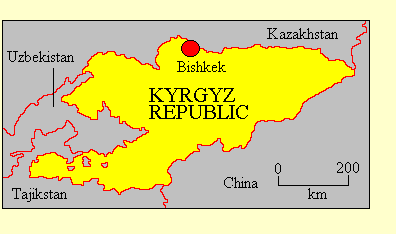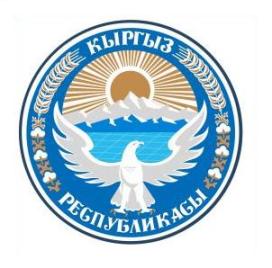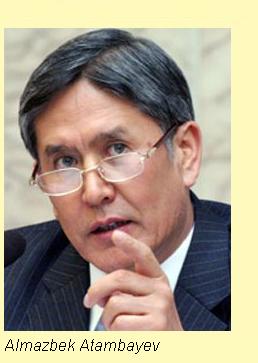

KYRGYZ REPUBLIC
• Official name: Kyrgyz Respublikasy (Kyrgyz Republic). In English the country is frequently called Kyrgyzstan or Kyrgyzia.
• Location: Central Asia
• International organisations: Commonwealth of Independent States, Organisation of Islamic
Conference, Organisation for Security and Co-operation in Europe, United Nations, World Trade Organisation
• Borders: China, Kazakhstan, Tajikistan, Uzbekistan
• Coastline: None
• Land area: 198,500 Km2
• Population: 5,500,000
• Annual GDP (PPP) per capita: US$2,100 (2009 CIA estimate). World ranking: 151
• Ethnicity: Kyrgyz 52.4%, Russian 18%, Uzbek 12.9%, Ukrainian 2.5%, German 2%.
• Languages: Kyrgyz and Russian are the official languages. About 50% of the population speak Kyrgyz as their first language.
Russian is the language of business and comminications and the first language of 20% of the population. It is widely used even among ethnic Kyrgyz. Uzbek, Ukrainian and German are also used.
• Religion: Sunni Moslem 75%, Orthodox Christian 20%
• Form of government: Presidential republic. The Kyrgyz Republic is divided into seven provinces and the
capital city district.
• Capital: Bishkek
• Constitution: The new Constitution
of the Kyrgyz Republic came into effect on 27 June 2010.
• Head of state: The President, elected by direct universal suffrage for a non-renewable six-year term.
The Constitution makes the President the effective head of the government.
• Head of government: The Prime Minister, appointed by the President. Under the new Constitution the
Prime Minister will be accountable to the legislature.
Almazbek Atambayev has been Prime Minister since
17 December 2010.
• Legislature: The Kyrgyz Republic has a unicameral legislature, the Supreme Council
(Joghorku Kenesh / Parlament Kyrgyzskoi Respubliki), which has 120 members, elected for
five-year terms by proprtional representation.
• Electoral authority: The Central Election Committee
administers national elections. (Website currently offline, but it comes and goes.)
• Freedom House 2011 rating: Political Rights 5, Civil Liberties 5
• Transparency International Corruption Index: 20% (164 of 178 countries rated)
• Reporters Without Borders Press Freedom 2010 Index: 37% (159 of 178 countries rated)
• Heritage Foundation Economic Freedom 2010 Index: 61.1% (83 of 179 countries rated)
Political history
The Kyrgyz-speaking lands were under the sporadic authority of the Khan of Kokand when the Russians began to
penetrate the area in the mid 19th century. Between 1855 and 1873 the area was annexed to the Russian Empire.
The Kyrgyz were never fully subdued, however, and as late as 1916 there was a major revolt against Russian rule.
When the Russian Empire collapsed there was another revolt, but in 1918 the communists gained control of the area.
Kyrgyzia became part of the Turkestan Autonomous Soviet Socialist Republic in 1918, then a separate Kara-Kyrgyz
Autonomous Oblast in 1924 and finally a Soviet Socialist Republic in 1936.
When Soviet power weakened in 1990, ethnic violence broke out between between Kyrgyz and Uzbeks and elections were
held which brought Askar Akaev to power with the support of the reformist wing of the Communist Party. The Kyrgyz Republic
became independent when the Soviet Union was dissolved at the end of 1991. Akaev became the most thorough-going
reformer of the central Asian ex-Soviet leaders, but his rule grew steadily more authoritarian.

In 2000 Akaev was re-elected as President without serious opposition, and the legislative elections were
dominated by the President's supporters. Elections were held on schedule in 2005, but allegations of
election rigging, especially in the majority-Uzbek regions, led to the outbreak of anti-government disturbances,
inspired by the events in Georgia and Ukraine. Akaev was driven from power and replaced by Kurmanbek Bakiev, who
then consolidated himself in power by much the same methods used by Akaev. At the 2007 legislative
election, held under a new electoral law, the opposition won no seats. Bakiev was re-elected President
against only token opposition in 2009. In April 2010, however, another revolution broke out, provoked by rising
energy prices but organised and supported by the Putin regime in Russia. Bakiev left the country without
formally resigning, and Roza Otunbayeva became Head of the Provisional Government. At free elections in
October 2011, Atambayev Almazbek, a social democrat
who had been Prime Minister since December 2010, was elected President.
Freedom House's 2011
report on the Kyrgyz Republic
(which was written before the 2011 election) says: "[The Kyrgyz Republic] is not an electoral democracy, though the
October 2010 parliamentary elections were considered an improvement over the deeply flawed 2007 parliamentary and
2009 presidential votes. OSCE observers praised the latest campaign's pluralism and other positive features...
Constitutional changes adopted in the June 2010 referendum [are intended to] prevent the re-emergence of an
authoritarian president and a rubber-stamp parliament where the ruling party enjoys a supermajority...
Corruption is pervasive in Kyrgyz society... Kyrgyz-language media experienced less politically motivated
harassment after the fall of the Bakiyev government, but Uzbek-language media virtually ceased to exist in
southern Kyrgyzstan after the June ethnic violence... Restrictions on freedom of assembly eased significantly
under the interim government... Freedom of association is typically upheld, and NGOs participate actively in
social and political life... The judiciary is not independent and remains dominated by the executive branch.
Corruption among judges, who are underpaid, is widespread."
Updated January 2012
|

